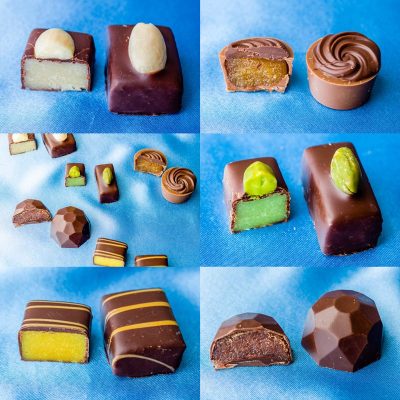
There’s so much to report about my recent trip to Vienna, hosted by the Jewish Welcome Service, and so little time to do it right now as I prepare to leave for a book tour. But I won’t bury the lede. I’m thinking very seriously of returning to Vienna next year for a much longer time — a minimum of three months, the length of a tourist visa. If I can get a work or study visa for some of the projects I have in mind, I’d like to stay even longer.
And do I even have to tell you (I guess I do, because a few people already have asked)? OF COURSE I’LL BRING MADELEINE.
I’m also planning to apply for dual citizenship. As someone whose parents were both born in the city and forced by the Nazis to leave — or, rather, forced to try to get out by hook or crook or be sent to their deaths — I am likely entitled to Austrian citizenship.
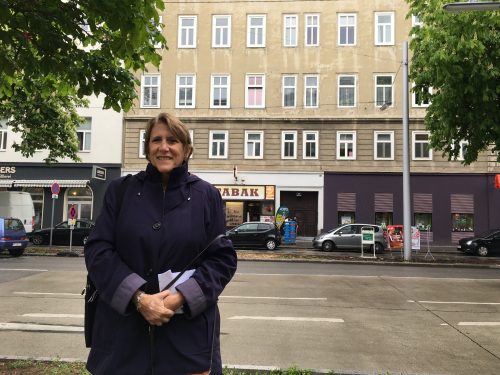
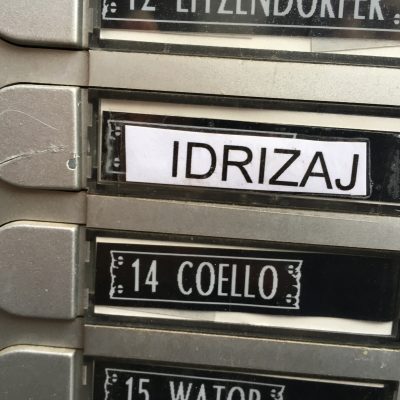
I can’t think of a better time to consider that contingency. Wouldn’t it be ironic to have to flee to Austria because of the political situation in the U.S.?
All this to say there’s a high likelihood that there will be plenty of reporting about Vienna in my future. And yours.
A Few Things that happened on this trip to Vienna
- I stayed at the superb Hotel Stefanie, the oldest hotel in Vienna though it’s as spiffing as if it were new.
- I ate lots of pastry and went on a fruitless (pun intended) search for marzipan candy. See the picture in the corner of this post? This was put on Facebook by my new blogger friend Nino Loss of Schibboleth fame after I returned from Vienna. I thought that was cruel but I admit it did have an inspirational effect.
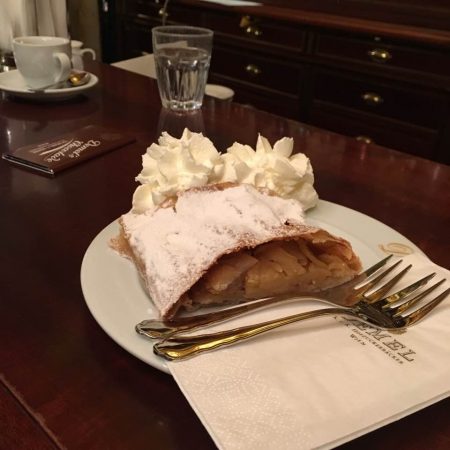
- I drank lots of beer.
- I ate schnitzel and goulasch.
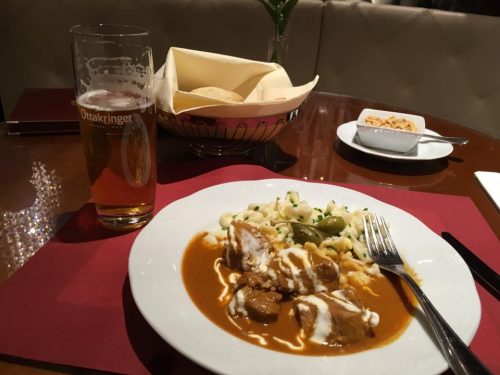
- I met some relatives I knew I had and a possible relative I thought I might have; made several new friends; and met a few old friends, including one for the first time.
- I found my father’s house (see earlier photos) at the Archive of the Jewish Community, Vienna, and discovered my grandmother’s birth name was Malvina, not Mathilde as I had always thought. My sister, who was named Tilda after her maternal grandmother, should probably be grateful.
- I’m pretty sure I found the site of the Cafe Victoria, which OSK (the Other Siegmund Kornmehl) owned.
- I went to the University of Vienna Medical School to meet with the head of the psychology department.
- I contemplated my connection with Vienna.
These are all teasers, yes. I promise more details soon (which may be August).
Speaking of teasers, I forgot to mention that I found out the fate of a mystery member of my family before I went to Vienna. Stay tuned….

I’m truly interested in reading in future about what being in Vienna does for you.
You forgot to mention all of the ministerial meetings . Let us know when your return date is scheduled.
There was a great deal I didn’t mention — but if you’re interested in writing about any aspects of the visit, I would love to have a guest blog post from you!
Here it is: Perhaps it is too long: Not having blogged before (read or written) and now inspired to respond, how could this have happened? I, too, was a member of the Spring 2017 Jewish Welcome Service expedition to Vienna that Edie has documented. In the recent Newsletter from the JWS, describing the trip, I came across the link to Freud’s Butcher and read Edie’s account of her experiences (my first blog experience). And “commented” (my first). I was really surprised to receive, almost immediately, an email response from Edie asking me to contribute to her blog. Does that mean she reads comments to her blog instantaneously? Does she have a message app that bleeps whenever someone comments? It was miraculous.
At any rate, from a link on her blog, I next explored her website and learned a lot more about her then I ever learned during our time together in Vienna. In Vienna, there was a lot of unscheduled time so we could go explore our individual interests. On her website, I learned that Edie was also a prolific author/writer/editor. Attracted to the title Getting Naked for Money, I downloaded the book and learned even more about her. I read her book almost straight through and loved her writing style, her humor, her pathos and her life’s course. That is why, after reading her book and perusing her website, I feel inspired to try and tell a few stories of my own. After all, she did invite me to contribute to her blog. So here goes (with fingers crossed given her wizardry with the English language):
The Jewish Welcome Service had sponsored a 6-day, all expense paid visit, including transportation, to Vienna this past Spring. Who can turn that down? I was especially pleased to accept since I had already planned a 6-week stay to explore my origins. The JWS invitation perfectly overlapped my time. I felt guilty in accepting, however, because my Jewish identity was far from firm—certainly not nearly as firm as every other member of the 40+ participants from countries as widely dispersed as Uruguay, Columbia, Israel, New Zealand and the U.S. In part, my guilt and confusion were the very reasons I had decided to explore my origins in more depth with or without JWS? Who was I? Where did I come from?
I begin this first blog response by telling the story of how I got to the Jewish Welcome Service from a long time ago. I was born in Vienna (one of only four of the forty on the 2017 JWS roster) and left with my parents, also Viennese born, in 1938 for New York at the invitation of the Nazi Anschluss. My mother was 23, my father 30 and I was 2 years old. None of us spoke any English. Probably I spoke relatively little of anything at that age. Although, my mother did tell me years later that I was able to say, “Mutti, die marschieren shon wieder.” “Mommy, they are marching again.” Now, as I think about what she told me, I’m not sure whether I was referring to German soldiers or Austrian Nazi’s marching in the streets below our first district apartment on Rathausstrasse. That’s me in front of the apartment.
We arrived in NY on July 4 and the only other thing my mother later told me that I was also able to say was, “Schau die grùne Puppe an”, “Look at the green doll” referring to the gorgeous Ms Liberty as our boat entered the harbor. After a year in NY, followed by a few in Milwaukee WI, my family and I finally settled in San Francisco when I was 8 years old. I still consider San Francisco my “home town” although that construct has been seriously challenged by the recent stay in Vienna. At any rate, neither of my parents (now both deceased) ever spoke a word about our flight or the circumstances surrounding our immigration. Throughout my childhood, my family, now with an additional 2 San Francisco born brothers, celebrated all the ”U.S. holidays”; Thanksgiving, Christmas and Easter. Nary a word was ever spoken in our house about Judaism, immigrant angst or family left behind. Nor, sadly, did I ever ask any questions. We were a “happy”, upwardly mobile Viennese-American middle class family—no worries Mon.
At age 8 in San Francisco, I started attending a Protestant Sunday School and the neighborhood public grammar school. After 2 years in the local public junior high school, my parents transferred me, against my protestations, to the more distant, all boys Jesuit High School “because Latin and Greek were taught;” subjects my mother had experienced in her Vienna Gymnasium. Since my parents knew that I was destined to become a doctor, my mother assured me that the Latin and Greek would “be good for my future.” As a dutiful son, I said goodbye to my neighborhood friends and soon thereafter found my first girlfriend who attended the nearby Catholic girls high school. I felt especially proud that her older brother, who had attended my high school, let me wear his school jacket; I felt especially secure because whenever I visited her in her house, she intimately anointed me from the holy water font at the entrance. The daily Religion class at school and the required First Friday masses that all students were required to attend solidified my belief that my path to salvation was to become a Catholic. But for reasons that I did not understand at the young age of 16, my Father said, “NO WAY.” For all intents and purposes, I was a Protestant/Catholic wannabe teenager.
There is one memory that in retrospect should have clued me. Around my 13th birthday, I was driving somewhere with my Father and I was grousing (as usual) that my life would be much better if only I had a motor scooter, something that a few of my friends had. Inadvertently, my father, who was usually quite reticent, said, “If you were Bar Mitzvah, I would get you a motor scooter.” At least I think I remember him saying that, but since I had no idea what Bar Mitzvah was, I passed the comment by. (And, I never got a motor scooter until much later, but that’s another story.)
Nevertheless, I was “in love” with a Catholic girl and desirous of “converting” to Catholicism, widely supported by her parents and by some of my Jesuit instructors. After my sophomore year, perhaps knowingly, but unbeknownst to me, my parents sent me on a summer tour of Europe (1952) with a group of high school students from a nearby Bay Area community. Oddly, serendipitously, by design, who knows, it turned out that all of the students, except me, were Jews. Of course, their Jewishness was lost upon me as I joined this group of strangers. Only later on the trip did my “Goyism” become apparent as I began to fathom a distinction between Jew and non-Jew. Clueless? Naive? That was I. Nevertheless, as the Zephyr for Chicago and the New York piers pulled out of the Oakland train station, with its upper romantic, observation deck, I noticed the most beautiful girl that I had ever seen. Memories of my left-behind, Catholic love magically dissipated. As reluctant as I had been to leave her for a summer in Europe, I guess my parents did know something. The trip turned out to be the best summer ever. My relationship with my newfound girlfriend continued into my freshman year of college—I the Goyim, she the Jewess. Needless to say, her parents were not happy; perhaps tolerant. Mine made no comment although I am sure they were relieved to see my zealous pursuit of Catholic conversion on the back burner. College pursuits and new friends had shifted my focus.
Imagine my surprise then when one night when my Jewish princess and I were together, she announced that this was our last outing. When I asked her why, she replied, “You’re really a Jew and there is nothing worse than a Jew hiding as a non-Jew.” I was shocked. I was stunned. But, as foretold, I never saw her again. She never answered calls or letters. Apparently, one of my parents’ Austrian friends who lived in the same neighborhood as she, told her parents of our family’s history.
It was at the age of 17, as a college freshman, that the explorations of my origins began albeit not very seriously. My parents still did not talk about their past and their experiences in Vienna. They thought my girlfriend’s response to be foolish, trivial and inconsequential and were sure that I would get over my broken heart and confusion. They were right, as usual.
In college, I joined a fraternity that in theory, though not in practice, excluded Jews. I did, in fact, graduate from medical school and passed as the only Goy in my internship class at Mount Sinai Hospital in NYC. Subsequently, I became a psychiatrist and psychoanalyst, a card-carrying member of the American Psychoanalytic Association, and then a faculty member at Montefiore Hospital and Albert Einstein College of Medicine. In hindsight, it now seems apparent that all the while I was “unconsciously” pursuing my Jewish/Viennese pathway. Even back in medical school, many of my closest personal friends and later my professional colleagues were Jewish. Some of the immigration and Viennese life style “facts” were discussed in my personal analysis, but never the core and guts of who I was. An integrated sense of self continued to elude me. Only in the mid-1990s (a story for a future blog) did I really begin to explore Judaism and the meaning of being Jewish despite my mother’s continual protestations that my explorations were folly. My father had died prematurely, before my explorations took a more serious turn; thus, no chance to talk with him. And this JWS trip to Vienna occurred a few years after my mother’s death finally freeing me to more fully explore. So what did I find out?
Austritt in German can be translated as “exit.” Before WW II, births, marriages and deaths in Austria were recorded in records (books) that were maintained by each distinct religious community, not in a central Viennese or Austrian registry. Newborns were registered according to the religion of their father, not mother. The Israelitischen Kultusgemeinde (IKG), a part of the first district’s City Synagogue (Stadttempel), maintained the Jewish registry. The IKG functioned during most of WW II, closed only in 1943 when the Nazi implemented their Final Solution. It has been re-established and its digitized Archives Section, under the able leadership of Mrs. Irma Wulz, is most helpful in tracking down records originating as far back as the early 1800s (www.archiv-ikg-wien.at).
I found out that on my father’s side of the family, my grandfather ended his life in Auschwitz. My Grandmother died of natural causes in 1931. I found out that on my mother’s side of the family, my grandmother austritted from the Jewish registry, from where she had been inscribed at birth, in 1913. She married her first cousin in a civil ceremony (even though he was inscribed in the Jewish registry) in 1914 and gave birth to my mother in 1915. Despite her father being Jewish, my mother was not registered at IKG, but rather registered and baptized in the Evangelical community. On my mother’s birth certificate, her parents are described as “konfessionsloss”, “without a religion.” In 1921, her mother, my maternal grandmother, committed suicide in her home via gas inhalation. I wish I knew what was going on with her. My grandfather remarried another austritted Jewish woman, again in a civil ceremony (her austritt, however, occurred in 1937). He and my step grandmother had another daughter, the stepsister of my mother, who also was never inscribed in the Jewish register.
My Jewish father married my “non-Jewish/Jewish”-Evangelical mother in a civil ceremony in 1935. When I was born in 1936, I was inscribed in the Jewish registry because of my father’s faith but was baptized on day 3 of my life in the local Catholic Church a few blocks away from the hospital in which I was born. My father austritted the Jewish registry in 1937. We left Vienna in 1938. Clearly, Vienna in the 1920s-1930s was a vibrant, culturally diverse, fluid and exciting city. Anti-semitism, though illegal, preceded Nazism. What choices did assimilated Jews have during this period? They could convert, they could inter-marry, or they could become secular. My families did all of the above. Although all of my great grandparents were practicing Jews (more or less) with synagogue weddings and Bar Mitzvahs, my grandparents’ generation began to drift, as did my parents (except, I guess, my Father who secretly wished that I had been Bar Mitzvah). I’m sorry that I was never able to talk to him about that. But, perhaps, he might not have been able to discuss his “secrets”. After all, he lost his father in a death camp and was never able to talk about that either. For some wounds, denial is the most adaptive outcome.
By the way, I should have known all along when I was in high school that I did not need to get converted to Catholicism. I had been baptized a Catholic at birth. Ironically, in the 1990s when I began to explore my Jewish origins more seriously with a reform Rabbi, he told me that I needed to be converted to Judaism. What Chutzpah. There are many more stories about my trip to Vienna but I think I’ve done it for my first blog. Thanks Edie.
As I have promised, I will elevate a distilled version of this post — and others you sent — to proper blog post status but in the meantime, it deserves to be published. In addition to this fascinating information, I thank you for your kind words about my book!
Hello Edie, my attention was drawn to you blog by Susanne Trauneck. I read your story with interest as I have been invited for the next tour organized by the Jewish Welcome Service. In addition to myself, my sister and my two cousins with spouses will be going in October. So apart from giving us insight into the city of our parents’ childhood and youth and perhaps new personal knowledge, the visit will also bring us from Denmark together with our relatives from the U.S. – a great family reunion. Looking forward to hearing more about your experience.
Thanks very much for your comment. I am sure you will enjoy your trip with the Jewish Welcome Service, and how wonderful that you will have a family reunion, too! Do come back here afterwards and tell us how it went. I have invited others who were on the trip with me to post about it here, so stay tuned….
I certainly will.